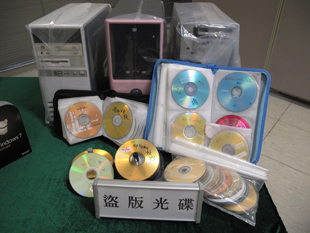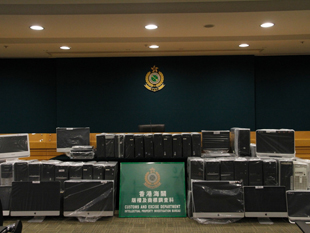Intellectual Property Protection
Protecting intellectual property is important because it ensures that creativity can flourish and business can be conducted in a fair manner. Here you can learn more about the relevant ordinances, what constitutes infringement, and how one can avoid breaking the law.
Intellectual Property Defined
Intellectual property is the collective name for a range of intangible property rights, including trade marks, patents, copyright, designs, plant varieties and the layout design of integrated circuits.
 Copyright subsists in original literary works, dramatic works, artistic works, musical works, sound recordings, films, broadcasts, cable programmes and typographical arrangement. The copyright owner enjoys the exclusive rights to carry out acts restricted by the copyright. Anyone without the copyright owner’s permission would not be allowed to carry out any acts restricted by copyright, including but not limited to copying and distributing copyright works. Under the Copyright Ordinance, copyright owners can take legal action against anyone or any organisation who infringes copyright without their permission.
Copyright subsists in original literary works, dramatic works, artistic works, musical works, sound recordings, films, broadcasts, cable programmes and typographical arrangement. The copyright owner enjoys the exclusive rights to carry out acts restricted by the copyright. Anyone without the copyright owner’s permission would not be allowed to carry out any acts restricted by copyright, including but not limited to copying and distributing copyright works. Under the Copyright Ordinance, copyright owners can take legal action against anyone or any organisation who infringes copyright without their permission.
Intellectual Property Right Protection
Intellectual property rights are protected in Hong Kong under various ordinances, which include:
- Copyright Ordinance
- Prevention of Copyright Piracy Ordinance
- Trade Marks Ordinance
- Trade Descriptions Ordinance
- Patents Ordinance
- Registered Designs Ordinance
- Plant Varieties Protection Ordinance
- Lay-out Design (Topography) of Integrated Circuits Ordinance
Intellectual Property Right Infringements

One of the more common instances in which intellectual property rights are infringed in Hong Kong is through computer software piracy.
Under the Copyright Ordinance, simply using pirated computer software for private and domestic use is not an offence. However, the copyright owners can still claim damages against the infringers through civil proceedings.
Criminal liabilities under the Copyright Ordinance mainly relate to possessing or distributing pirated software for commercial purposes.
For example, an Internet café or computer games centre that conducts its business using pirated copies of computer software will be penalised.
It is also important to note that a person will incur criminal liability if he distributes the pirated software to such an extent as to affect prejudicially the owner of the copyright, even though he may not be distributing the pirated software for commercial purposes.
The Court of Final Appeal on 18 May 2007 dismissed the appeal of an appellant, who had been convicted and sentenced to three months' imprisonment for uploading copyright-infringing films to the Internet using the BitTorrent (BT) peer-to-peer file-sharing program. This was the world's first ever enforcement operation leading to conviction and imprisonment of a person who distributes infringing copies of films using the BT program.
The judgment reaffirms that the uploading of infringing copies of copyright works to the Internet using the BT peer-to-peer file-sharing program for downloading by other Internet users is a criminal offence under the Copyright Ordinance in Hong Kong.
The Customs and Excise Department, which is responsible for taking legal action against intellectual property right infringement, monitors activities on the Internet round the clock, including copyright piracy involving the use of peer-to-peer file-sharing programs and other new technologies.
Under the Copyright Ordinance, a person commits an offence if he/she, without the licence permission of the copyright owner, distributes an infringing copy of a copyright work to such an extent as to affect prejudicially the owner of the copyright even if it is not for the purpose of trade or business. The maximum penalty is a fine of $50,000 per infringing copy and imprisonment for four years.
In addition to the above, trade marks may be included in computer software. Under the Trade Marks Ordinance, the owner of a registered trade mark has an exclusive right to use the mark on the goods or services for which the mark was registered. The owner can take legal action against anyone using his registered mark in relation to those goods or services without his consent. You should therefore bear in mind the potential liability for trade mark infringement as well.
Preventing Infringement
The Customs and Excise Department combats intellectual property right infringements on three levels:
- Wholesale: the main focus is on halting the importation of pirated products into Hong Kong, the manufacture of pirated products for exportation, and the wholesale and distribution of pirated products within Hong Kong
- Retail: action is being taken repeatedly against the sale of pirated products at the street level, with surveillance and seizures leading to prosecution
- Internet: to address the emerging trend of online copyright infringement, two Anti-Internet Piracy Teams and a Computer Forensic Laboratory have been established.
Respect for Intellectual Property Rights
One of the most common instances of intellectual property right infringement is through file sharing on peer-to-peer (P2P) networks. File sharing software such as BitTorrent (BT) can link your computer to others in a network for direct sharing of any type of electronic file. Please note however that:
- File-sharing software can open your computer to viruses and spyware, small programs that ‘watch’ what happens, sometimes recording keystrokes and sending information on passwords and credit card numbers to a third party.
- Unless you are sharing music, programs or videos of your own creation, you are probably violating someone else’s intellectual property rights. Parents can be held responsible for what their children have done on the family computer, even if they are not themselves engaged in illegal activity.
Securing musical works online is not necessarily a legal offence. In fact, many retail websites allow you to buy various types of music from many periods. You can also legally download sample tracks from the websites of many artists without the need to pay.
More on Intellectual Property in Hong Kong